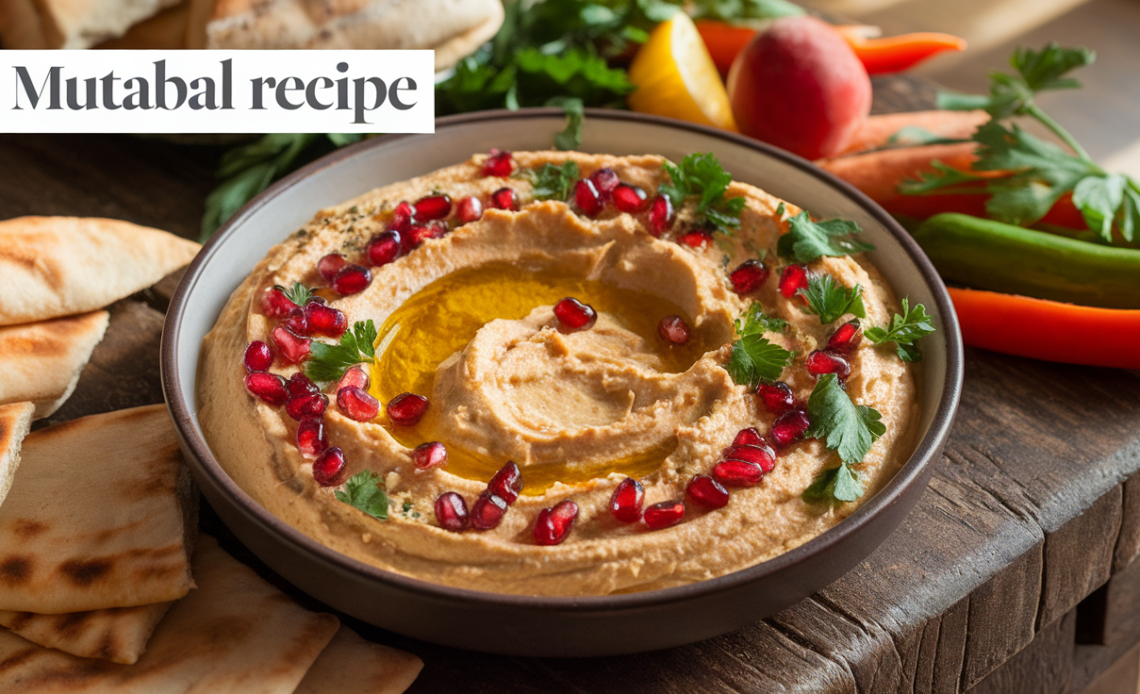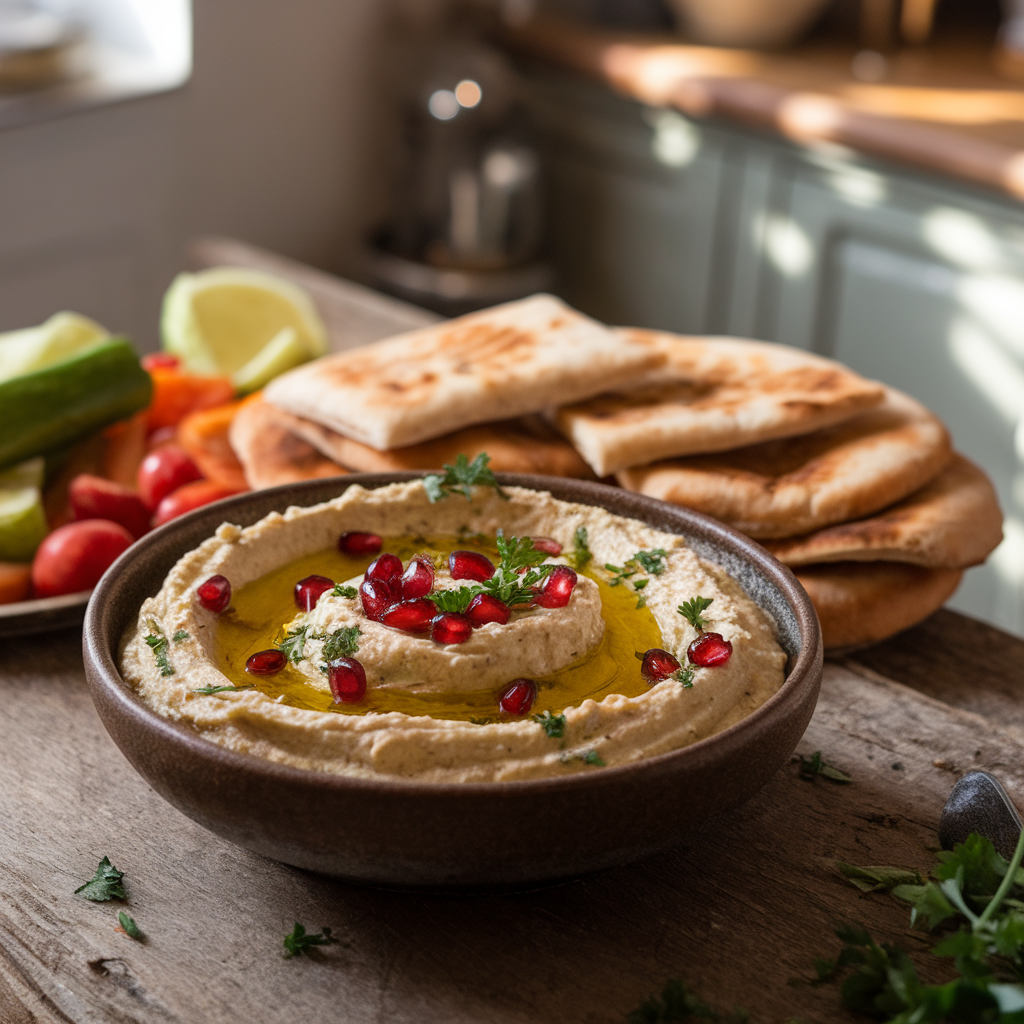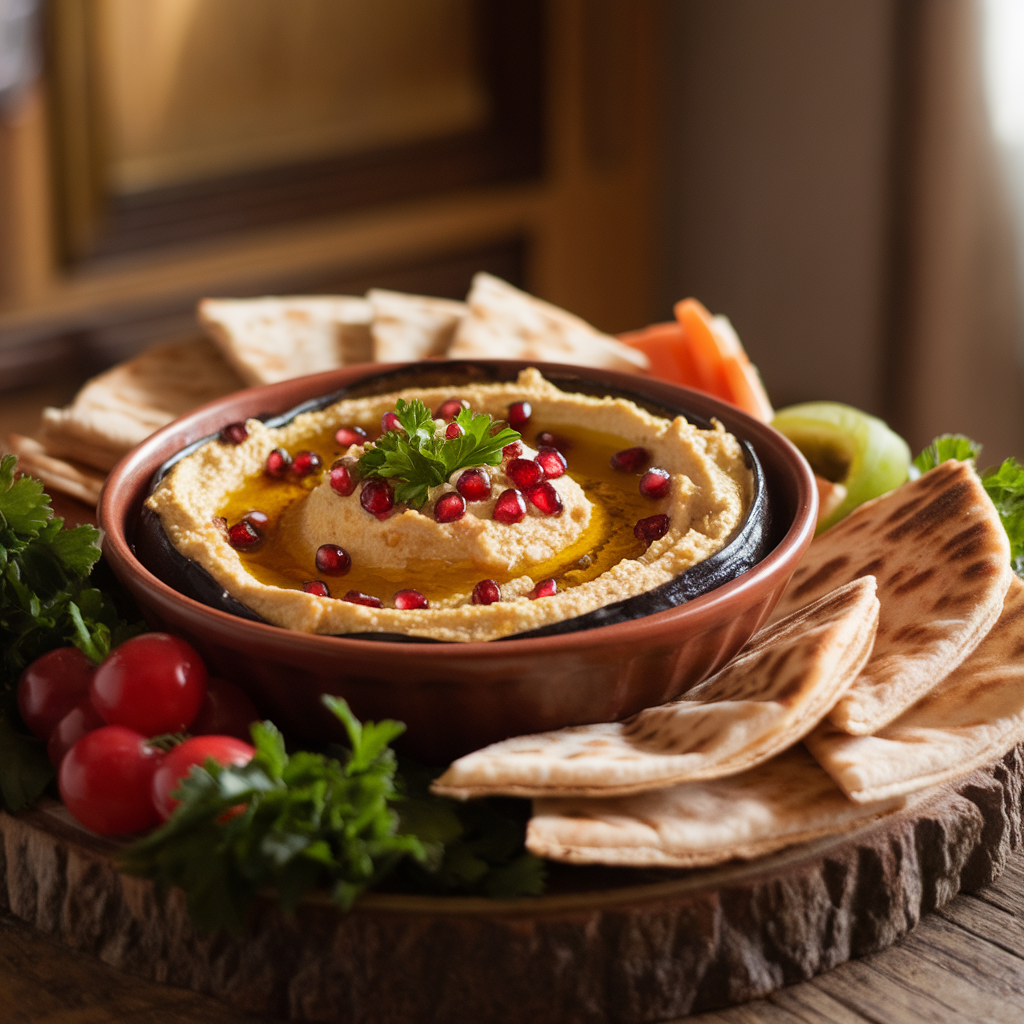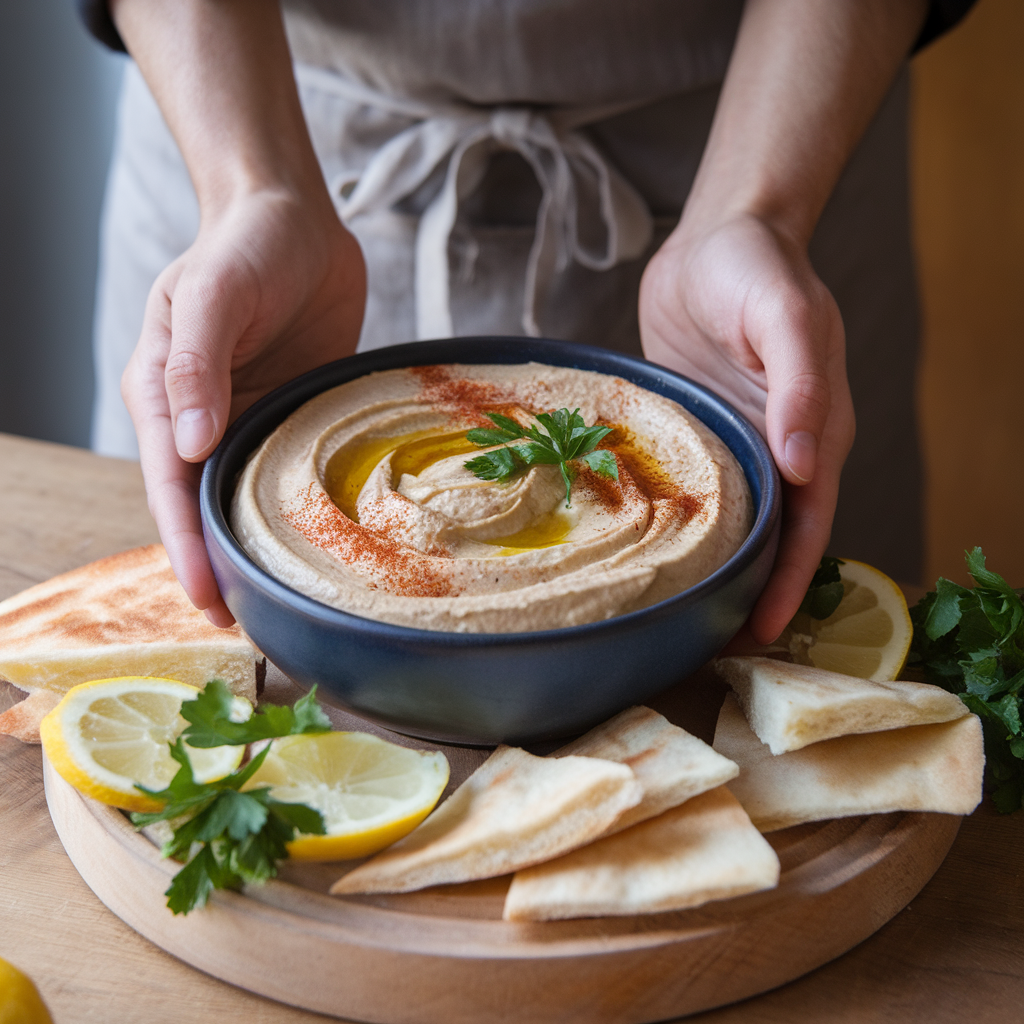
Eggplant dips have a timeless appeal in many cuisines, especially in the Middle East, North Africa, and Mediterranean regions. One standout among these is Mutabal, a creamy, smoky, and tangy eggplant dip that enchants with its simplicity and rich flavor. Whether you’re searching for Middle Eastern aubergine recipes, craving a Romanian eggplant dip, or exploring a Moroccan eggplant dip, Mutabal fits the bill perfectly.
In this article, we will dive into the traditional Eggplant Moutabal recipe, its origins, variations, and tips for making a perfect, silky smooth dip. We will also compare it with other eggplant dip recipes like baba ganoush and Romanian spreads. So get ready to embark on a flavorful journey through Arabisk Mad (Arab food) and other delicious eggplant delights!
What is Mutabal?
Mutabal (also spelled moutabal or moutabel) is a smoky, creamy eggplant dip popular throughout the Middle East. The word “mutabal” means “spiced” in Arabic, referring to its seasoning with garlic, lemon juice, and tahini (sesame paste). It is often confused with baba ganoush, but there are subtle differences: mutabal tends to have a smoother texture and a stronger tahini flavor, while baba ganoush is chunkier and may include more herbs and vegetables.
The dip’s base is roasted aubergine (eggplant), which gives it that signature smoky taste. It’s typically served cold or at room temperature as part of a mezze platter with pita bread or fresh vegetables.
The creamy, velvety texture combined with the smoky undertones makes mutabal one of the most beloved roasted eggplant dips in Arab cuisine. This dish perfectly embodies the principle of simple ingredients combining to create extraordinary flavors—a hallmark of authentic Arabisk Mad.
Origins and Regional Variations
Mutabal is widely enjoyed across many Middle Eastern countries including Lebanon, Syria, Palestine, Jordan, and Israel. Each region adds its own twist to the dish, making it a versatile and cherished staple in homes and restaurants alike.
In North Africa, particularly Morocco, a similar preparation of roasted eggplant is seasoned with local spices such as cumin and coriander, making it a favorite Moroccan eggplant dip variant. This North African style often incorporates a bit more olive oil and occasionally fresh herbs, giving it a fresh and aromatic profile alongside the smoky depth.
In Romania and other Balkan countries, a comparable spread known as “salată de vinete” or Romanian eggplant dip/spread has a long-standing tradition. Romanian eggplant spread is often made without tahini and focuses on the simplicity of roasted eggplant, oil, lemon juice, and finely chopped onions. The resulting texture tends to be creamier and milder, often served as an appetizer with bread during gatherings and festive occasions.
Despite their differences, these recipes all highlight the humble aubergine’s potential to be transformed into a luscious, crowd-pleasing dip, making them beloved staples in their respective culinary cultures.
Ingredients for Traditional Mutabal Recipe
To prepare authentic Eggplant Moutabal, you only need a handful of simple ingredients, most of which you might already have in your pantry:
- 2 medium aubergines (eggplants) — preferably firm and shiny
- 3 tablespoons tahini (sesame paste) — the richer the better
- 2 garlic cloves, minced — fresh and pungent
- Juice of 1 lemon — fresh squeezed for brightness
- 2 tablespoons plain yogurt (optional) — for creaminess and tang
- Salt, to taste — enhances all the flavors
- Olive oil, for drizzling — preferably extra virgin
- Fresh parsley or mint, chopped (for garnish) — adds freshness and color
- Optional: a pinch of ground cumin or smoked paprika — to deepen the flavor profile

Step-by-Step Mutabal Recipe Instructions
Step 1: Roast the Eggplants
Start by roasting the aubergines until their skin is charred and the inside is soft and smoky. Roasting brings out the natural sweetness of the eggplant and infuses a beautiful smoky aroma essential to the dish.
You have several methods for roasting:
- Open flame on a gas stove or grill: This is the traditional way and gives the best smoky flavor. Place the whole eggplants directly over the flame, turning occasionally until the skin is blackened and the flesh is tender.
- Oven roasting: Preheat the oven to 220°C (425°F). Pierce the aubergines with a fork to prevent bursting and place them on a baking sheet. Roast for about 40-50 minutes, turning occasionally, until the skin is wrinkled and the inside is soft.
- Grill: Perfect for summer cooking. Cook on a hot grill, turning until charred and soft.
Once roasted, place the hot aubergines in a bowl and cover with cling film or a kitchen towel for about 10 minutes. This allows the steam to loosen the flesh, making it easier to scoop out.
Step 2: Scoop Out the Flesh
When cooled enough to handle, peel off the charred skin and scoop out the tender flesh with a spoon. Avoid letting any burnt skin pieces fall into the flesh as it can impart bitterness. Place the flesh in a bowl and gently mash with a fork to remove excess moisture if desired.
Step 3: Blend the Ingredients
Add the tahini, minced garlic, lemon juice, salt, and yogurt (if using) to the mashed aubergine. Gently stir or pulse briefly in a food processor until the mixture becomes creamy and smooth but not too watery.
The tahini adds a luscious, nutty richness that sets mutabal apart from other eggplant dip recipes. The lemon juice brightens the dip, balancing the smoky depth, while garlic gives it a fragrant punch.
Step 4: Adjust Seasoning
Taste and adjust the seasoning with more salt, lemon, or garlic according to your preference. If you want to add a subtle spice, sprinkle a pinch of ground cumin or smoked paprika.
Step 5: Serve and Garnish
Transfer the mutabal to a shallow serving bowl. Drizzle generously with good quality olive oil and sprinkle with freshly chopped parsley or mint leaves. Optionally, scatter some toasted pine nuts or pomegranate seeds for an elegant touch.
Serve with warm pita bread, fresh vegetable sticks, or alongside grilled meats for an authentic Arabisk Mad experience.

Cooking Tips for the Best Middle Eastern Aubergine Recipes
- Pick firm, fresh aubergines: Avoid soft or wrinkled ones as they can be bitter or watery.
- Use open flame roasting when possible: This imparts the characteristic smoky flavor integral to Mutabal.
- Don’t rush peeling: Let the aubergines rest after roasting to soften the skin and make peeling effortless.
- Use high-quality tahini: Pure, unsweetened tahini with a rich sesame taste will make a noticeable difference.
- Add yogurt for creaminess: Though optional, a bit of yogurt softens the dip and adds a pleasant tang.
- Serve chilled or at room temperature: The flavors develop and mellow nicely after a couple of hours in the fridge.
- Finish with olive oil: A generous drizzle not only enriches the dip but also adds a beautiful sheen.
Mutabal vs. Other Eggplant Dip Recipes
When exploring eggplant dip recipes, you’ll notice some key differences among traditional variations:
- Baba Ganoush: Also popular across the Middle East, baba ganoush is similar but tends to be chunkier with less tahini and more herbs like parsley and sometimes tomato or onion. It’s earthier and less creamy than mutabal.
- Romanian Eggplant Spread (Salată de vinete): This version omits tahini and uses sunflower or vegetable oil instead. It often includes finely chopped onions and is whipped to a smooth texture, making it milder and less tangy than mutabal.
- Moroccan Eggplant Dip: Moroccan variations often include cumin, paprika, and occasionally garlic, parsley, or coriander. Sometimes, it’s combined with roasted red peppers to enhance the sweetness and add complexity.
Each variation highlights regional preferences but shares a core love for roasted eggplant’s smoky, velvety taste.
Nutritional Benefits of Mutabal and Roasted Eggplant Dip
Besides being delicious, mutabal is packed with nutritional value that makes it a healthy choice:
- Low in calories: Eggplants are naturally low-calorie and rich in dietary fiber, aiding digestion and promoting satiety.
- High in antioxidants: The roasting process enhances antioxidants like nasunin in eggplants, which protects cells from damage.
- Rich in vitamins and minerals: Including vitamin B6, potassium, manganese, and small amounts of folate and magnesium.
- Healthy fats and protein from tahini: Tahini provides heart-healthy unsaturated fats and plant-based protein.
- Anti-inflammatory properties: Garlic and olive oil contribute anti-inflammatory and immune-supporting compounds.
- Gluten-free, vegan-friendly (if yogurt is omitted): Suitable for various dietary preferences.
Serving Suggestions: How to Enjoy Your Mutabal
Mutabal is extremely versatile and can complement many meals and occasions:
- As part of a mezze platter alongside hummus, tabbouleh, falafel, olives, and fresh pita bread — perfect for sharing and social dining.
- Accompanying grilled meats like lamb kebabs, chicken shawarma, or fish for a well-rounded Middle Eastern feast.
- As a healthy dip for fresh vegetables such as carrot sticks, cucumber slices, radishes, or bell peppers.
- Spread on toasted bread or sandwiches to add a smoky, creamy layer.
- Served alongside Moroccan tagines or other slow-cooked stews as a refreshing and cooling side.
- At parties and gatherings as a flavorful appetizer — guests love its rich taste and wholesome ingredients.

Creative Variations to Try
To keep your eggplant dip recipes exciting and suit different tastes, here are some delicious twists on the classic Mutabal:
- Pomegranate garnish: Sprinkle fresh pomegranate seeds on top to add a burst of color and juicy sweetness.
- Roasted red pepper Mutabal: Blend in roasted red peppers for a smoky, sweet variation with added depth.
- Herb-infused Mutabal: Stir in finely chopped fresh dill, cilantro, or mint to brighten the flavor.
- Spicy Mutabal: Add a pinch of chili flakes, harissa paste, or a drizzle of chili oil for heat lovers.
- Nutty crunch: Toast pine nuts, walnuts, or almonds and sprinkle them on top for a crunchy texture contrast.
- Greek style: Use Greek yogurt instead of plain yogurt for a richer, tangier taste.
- Smoked paprika: A dusting of smoked paprika intensifies the smokiness and adds a warm, spicy aroma.
Storing and Making Mutabal Ahead
Mutabal keeps exceptionally well and is an excellent make-ahead dish:
- Refrigerate in an airtight container for up to 3-4 days.
- Before sealing, pour a thin layer of olive oil over the surface to prevent oxidation and maintain freshness.
- Flavors develop and mellow over time, making the dip even tastier the next day.
- Serve chilled or at room temperature depending on your preference.
Why Mutabal is a Must-Try for Eggplant Lovers
Eggplant is a highly versatile vegetable but can sometimes be tricky to cook due to its spongy texture and mild flavor. Roasting brings out its full potential by softening the flesh and infusing a delightful smokiness. When paired with tahini, garlic, and lemon, it transforms into Mutabal — a creamy, flavorful dip that excites the palate.
For those wanting to explore Middle Eastern aubergine recipes, mutabal is a wonderful introduction that’s easy to make and impressively delicious. Its popularity across regions highlights its universal appeal and the joy of sharing simple yet satisfying dishes.
Mutabal in the Context of Arabisk Mad (Arab Food)
In Arabisk Mad, mezze (small dishes) are an essential part of the dining experience. Mutabal is a shining example of how fresh, natural ingredients combined with traditional cooking methods create food that is not only tasty but culturally significant.
Mezze dishes like Mutabal encourage communal eating, conversation, and celebration. The dip reflects the philosophy of Arab cuisine: balance, harmony, and respect for ingredients. It’s often served alongside flatbreads, fresh vegetables, olives, and other dips such as hummus and labneh, providing a diverse palette of flavors and textures.
Final Thoughts
The Mutabal recipe is a shining star among eggplant dip recipes, combining the smoky depth of roasted aubergine with the creamy nuttiness of tahini, brightened by lemon and garlic. Whether you are looking to try a traditional Middle Eastern aubergine recipe, explore a Moroccan eggplant dip, or want to experience the charm of a Romanian eggplant spread, mutabal offers a delicious, healthy, and easy-to-make option.
Make this smoky, luscious dip at home today and delight your family and friends with an authentic taste of the Middle East. Remember, the secret lies in perfectly roasted eggplants and fresh, quality ingredients!




